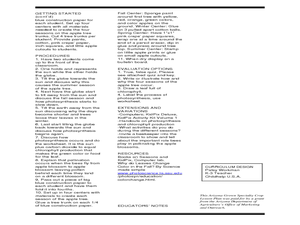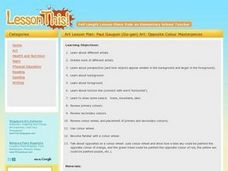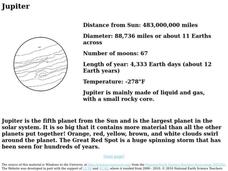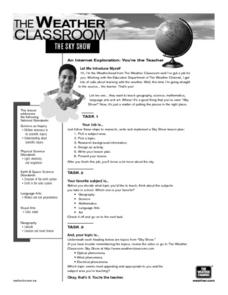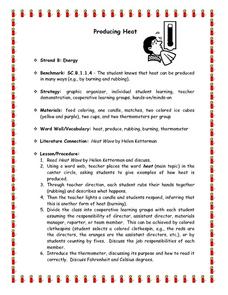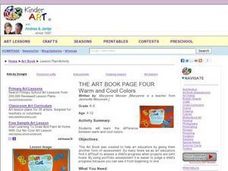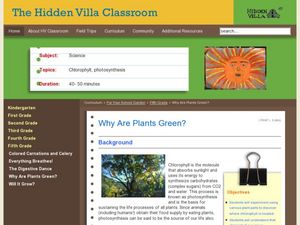Curated OER
Create a Food Chain
Students explore the food chain and the ways that animals depend on each other and on plants for food. They create a paper chain with different colors relating to carnivores and herbivores. The chains are linked to the sun to create a...
Curated OER
Fun Photosynthesis
Second graders, using large colored poster board, explore photosynthesis and its effect on the food chain and survival of organisms.
Curated OER
Apple: Bare to Pick
Students investigate the seasons of the apple tree. In tree seasons lesson, students use a sun model and a globe to study the tilt of the Earth to create the seasons. Students discuss the tilt and the seasons. Students discuss...
Curated OER
Descriptive Writing About a Picture
First graders word process a topic sentence, two detail sentences and a concluding sentence about an image. They import a picture and change the font color of their writing.
Curated OER
Paul Gauguin Art: Opposite Colour Masterpieces
Students discover new art techniques by examining the work of Paul Gauguin and his use of opposite colors. In this art analysis lesson, students investigate the different perspectives and colors used in classic post impressionist...
Curated OER
Star Light, Star Bright : Exploring How Stars Are Classified
Students work in small groups to organize stars into different categories. They consider size, luminosity, color and temperature, organize the groups and ten report their categories to the class.
Curated OER
ESL-Colors
In this ESL colors worksheet, students listen to a song titled "Sing a Rainbow," then sing the song and complete a "color" crossword puzzle.
Curated OER
Writing Similes
Fifth graders identify and write similes. They define simile and discuss different examples, and with the help of a thesaurus, write original similes that compare the colors of crayons to objects or feelings. Students copy their rough...
Curated OER
Earth and Seasons
Sixth graders comprehend that the path Earth takes as it revolves around the sun is called its orbit. They also comprehend that the axis is an imaginary line that passes through Earth's center and its North and South Poles. Students...
Curated OER
How Many?
In this book-making worksheet, students create a number and color book. Each page gives a picture of a group of items with a sentence. Students insert the correct number and trace the color word.
Curated OER
Making a Food Web and Learning About Ecosystems
Third graders examine the difference between a food web and food chain. They also examine the importance of the sun in a food web and food chain. Students understand what happens when you remove parts of the chain.
Curated OER
Scientific Images & Animations
Students view a variety of scientific images and animations. They explore the world of science and visual art. Students enrich their knowledge through animation examinations of thoughts and feelings and awesome color rainbows of...
Curated OER
Dimensional Flower Garden
Young scholars relate the colors in a garden to those in a rainbow by creating a multicolored three-dimensional garden portrait. They read, "Planting a Rainbow" by Lois Ehlert, then construct their garden with colored paper on white...
Curated OER
Jupiter
For this solar system worksheet, 3rd graders read facts about Jupiter including its position from the sun, the length of its year, and number of moons. They read about its color, clouds, and Red Spot.
Curated OER
The Sky Show
Learners use lecture and research to answer the question: Why is the sky blue? students research a variety of other sky phenomena, chart their observations and participate in experiments.
Curriculum Corner
Ice Cream Booklet
On the days leading up to summer, use a booklet of practice skill sheets in the classroom. Beginner pupils should be able to master the skills they've learned in math and reading before they head home for the summer, like counting to 30,...
Curated OER
A Study of Warm And Cool Colors
Second graders create a multimedia painting using warm or cool colors expressively. They demonstrate multimedia techniques in a drawing using pencil, oil pastel and tempera paints. They recognize and discuss mood created by warm and cool...
Curated OER
Exploring Scale And Ratio
Students measure the actual size and distance of the solar system using scale and ratio. They watch and discuss a video, create a distance-scale solar system model, and compare the scale sizes of planets to their actual sizes.
Curated OER
What's the Frequency, Roy G. Biv?
Introduce starting space scientists to the electromagnetic spectrum, expecially the portion of visible light. Teach them about wavelength and frequesncy. Then give them a roll of adding machine tape and a manila folder to make a...
Curated OER
Producing Heat
Students listen to "Heat Wave" by Helen Ketterman and discuss the story by creating a word web with heat as the main topic. They break into groups and conduct an experiment using a thermometer to record the temperature of melting ice...
Curated OER
Warm/cool Colors - Page 4
Students draw pictures that make them feel either warm or cool using only the warm and cool colors.
Curated OER
Why Are Plants Green?
Students smash plant parts and wait for visibility of chlorophyl to show why plants turn green. In this green plants lesson plan, students use acetone and filter paper for this experiment.
Curated OER
Pancakes, Pancakes (Elementary, Science)
Read Pancakes for Breakfast by Tomi De Paola then participate in different activities which practice skills such as English language development, using non-standard measurement, fine motor skills, dramatic play, and using our five senses.
Curated OER
What would Monet do with a digital Camera?
Students take ditigal pictures of any subject. Using Photoshop Elements, students organize and save their pictures. They edit the pictures using a Paint Dabs filter. Students discuss their photographs and how photography influenced the...


